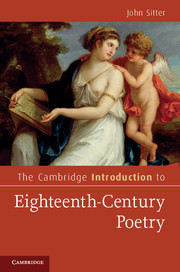Book contents
- Frontmatter
- Contents
- Acknowledgments
- Note on texts and titles
- Introduction
- Part I Voice
- Part II Poetic consciousness
- Part III Vision
- Chapter 9 Reading visions
- Chapter 10 Personification
- Chapter 11 Prophecy and prospects of society
- Chapter 12 Ecological prospects and natural knowledge
- A concluding note: then and now
- Notes
- Further reading
- Index
Chapter 11 - Prophecy and prospects of society
from Part III - Vision
Published online by Cambridge University Press: 05 June 2012
- Frontmatter
- Contents
- Acknowledgments
- Note on texts and titles
- Introduction
- Part I Voice
- Part II Poetic consciousness
- Part III Vision
- Chapter 9 Reading visions
- Chapter 10 Personification
- Chapter 11 Prophecy and prospects of society
- Chapter 12 Ecological prospects and natural knowledge
- A concluding note: then and now
- Notes
- Further reading
- Index
Summary
Many eighteenth-century poems are not only social but also sociological. This claim requires illustration, and specification. Modern sociologists would not be convinced by this chapter that their discipline begins with eighteenth-century poets rather than nineteenth-century historians and philosophers, and lovers of poetry may not feel their pulses quicken at the thought of poetic sociology, a phrase that sounds oxymoronic. To any social scientists who have happened upon this chapter and to students of poetry, let me say at once that I do not make scientific claims for Pope, Goldsmith, or other poets of the century. Instead, what follows will focus on eighteenth-century poets’ distinctive fascination with the “prospect of society” as a subject for poetry. This phrase comes from the subtitle of Goldsmith’s poem The Traveller (1764), but it could be the subtitle or title of his more famous poem, The Deserted Village (1770) – and of many other works, ranging from major poems such as Pope’s Windsor-Forest (1714) and the third epistle of An Essay on Man (“Of the State of Man with respect to Society”), Thomson’s Castle of Indolence (1748), Crabbe’s The Village (1783), and Cowper’s The Task (1785) to long-forgotten works such as Thomson’s Liberty (1735–6) or Richard Glover’s London (1739). It seems emblematic of the period’s openness to sociological poetry that Bernard Mandeville’s early foray into political economy, The Fable of the Bees (1714), began life as a poem (The Grumbling Hive; or, Knaves Turn’d Honest, 1705).
Personification and “society”
Probably the most famous eighteenth-century poem embodying social theory, Goldsmith’s The Deserted Village (1770), features Commerce, Trade, and Wealth merging into Depopulation and controlling the lives of the few remaining villagers. I will return to this work but want to note here the fated contest that Goldsmith stages between the chaste “fair Auburn” (the speaker’s native village) and the decadent “Land by luxury betrayed.” Neither Auburn nor the “rural virtues” can win out against the combined force of Luxury and “the Tyrant’s hand,” a kind of malevolent counterpart to Adam Smith’s “invisible hand,” about which more in a moment as well.
- Type
- Chapter
- Information
- The Cambridge Introduction to Eighteenth-Century Poetry , pp. 178 - 197Publisher: Cambridge University PressPrint publication year: 2011



